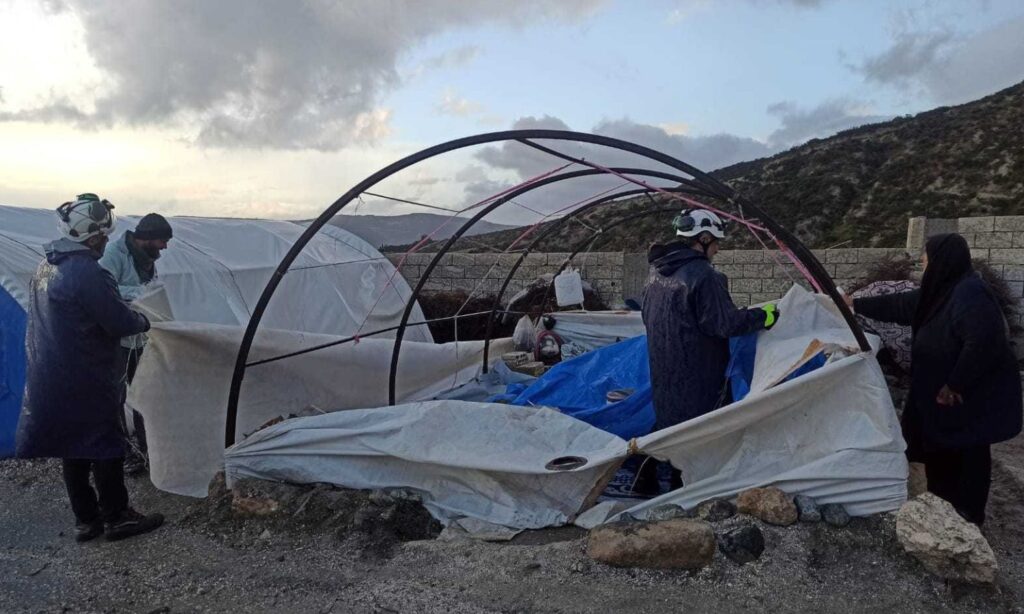An old, uninsulated tent is where Khaled al-Taleb, a 45-year-old man, lives with his six children in the Bakri camp in northern Idlib. He has not been able to change any part of its structure as winter approaches due to his financial difficulties.
Al-Taleb told Enab Baladi that he is currently unemployed and his family’s expenses depend on the work of his two daughters who sew baby diapers, which provides for their basic needs.
Last winter, the family received 40 kilograms of firewood and the same amount of olive pomace as support from an organization, which is a small amount compared to the family’s needs during winter. They have not received any support for this winter yet.
According to what Enab Baladi’s correspondent observed, the price of a ton of hazelnut shells used for heating is $145, firewood is $160, and olive pomace is $140.
No heating materials
Al-Taleb will not be able to secure any heating equipment for the winter, except for what his wife collected from animal dung during the summer and prepared for heating.
Fatima al-Aref, a 70-year-old resident of the al-Layth camp on the eastern outskirts of Harbanoush, told Enab Baladi that she has gathered plastic bags to burn them for heating her dilapidated tent, despite the harm it poses to her health.
Al-Aref’s tent has not had its plastic cover replaced for five years, and it is not insulated. Last winter, she used blankets in place of insulation, but they did not prevent water from leaking.
As for Mustafa al-Dibo, 45, he collects some fallen olive branches and leaves around his tent in the Harbanoush camp. “There are no supplies this year, and the weather is already very cold,” he said.
Al-Dibo, who works daily with a wage of 100 Turkish lira ($2.9), is trying to prevent the cold as much as possible by putting blankets over his tent, but this does not stop the water leaks.
Civil defense teams are working to drain rainwater that inundated a camp in northwestern Syria – November 3, 2024 (The White Helmets)
Various areas in northwestern Syria experienced flooding due to a rainstorm on November 3, causing material damage and road closures.
The Syria Civil Defence teams (The White Helmets) responded in ten camps, where roads and 22 tents were damaged, including the al-Jourah camp near the village of Adwan in western Idlib, the al-Hawija camp near Maarat Misrin, and the Musaybin and Olive Branch camps in Qabasin, western Aleppo.
The Syria Response Coordination Group (SRCG) reported damages in the displacement camps and shelters, including 88 tents, housing units, and caravans distributed across 39 camps.
Humanitarian needs
According to the United Nations Office for the Coordination of Humanitarian Affairs (OCHA), 5.1 million people live in northwestern Syria (opposition-controlled areas), including 4.27 million who are in need of humanitarian aid.
From January to October 28, 2024, aid has reached only 920,000 people, or 27% of those in need.
2.1 million people live in camps out of the 5.1 million in the region, with aid reaching only 310,000, or 16% of the total camp residents.
The number of people in need of food assistance in northwestern Syria is 3.645 million, with aid provided to 610,000 of them, or 17%.
The northwestern region of Syria is under the control of the opposition, managed by two de facto governments: the Syrian Interim Government (SIG) and the Syrian Salvation Government (SSG).
The Interim Government extends its influence over Aleppo countryside and the cities of Ras al-Ain in western al-Hasakah and Tal Abyad in northern Raqqa, while the Salvation Government controls vast parts of Idlib and parts of western Aleppo, northern Hama, and eastern Latakia.
The region is continuously subjected to bombardment by the regime forces and Russia, particularly in the areas under the control of the Salvation Government, despite the ceasefire agreement signed in Moscow between Turkish President Recep Tayyip Erdoğan and his Russian counterpart Vladimir Putin.

